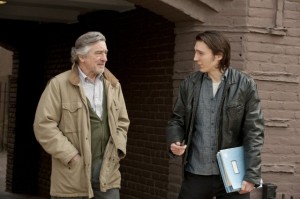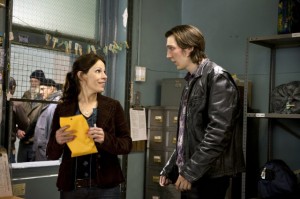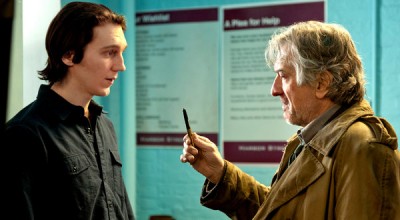
I saw three films of considerable merit this weekend—Footnote, The Kid with a Bike, and this latest film from Paul Weitz, Being Flynn. It is this last that is most likely to find its way onto my shelves. Is it the best of the three? I’m inclined to say that, no, it isn’t, though it’s frankly idiotic to try to weigh three films so different from each other in that manner. In fact, Being Flynn may be the most flawed of the three, but it is also the one that most connected with me, and the one where I was most drawn to the style of the filmmaking. (It is also the most likely to end up on my best films of 2012 list.) But in its very ambition, it does evidence a few problems. If nothing else, it absolves Paul Weitz for having made Little Fockers (2010), makes up for most of Robert De Niro’s choices in the past few years, and drives home what a unique, fascinating and often overlooked actor Paul Dano is.

The film is based on a book by Nick Flynn (played by Dano in the film) called Another Bullshit Night in Suck City: A Memoir, but is presented from two points of view—that of Nick and that of his errant father, Jonathan (DeNiro). What the film does not tell us—and perhaps it doesn’t really matter—is whether or not the point of view of the father is real, or only what Nick imagines. It works either way, though in many respects Jonathan is the more clearly drawn character, which may have something to do with distance—or which may simply be because there’s a certain strength of background that comes with DeNiro’s presence. That goes doubly when he plays a delusional, hate-filled cab driver, as he does here in the film’s first stretch. This role is something that inevitably calls to mind the De Niro of an earlier era, and it’s something that runs the risk of looking looking pretty pallid by comparison to a Taxi Driver-era De Niro. That this performance doesn’t look pallid, and that it doesn’t trade on that earlier role, except in passing, is a testament to the quality of the film at hand.

Jonathan Flynn is—in his own mind—one of the three worthwhile writers ever produced by America (the others being Mark Twain and J.D. Salinger, which would doubtless come as a relief to them). OK, so he’s never published anything (but he does have a rejection letter from Viking Press that—if you read it selectively—sounds pretty impressive), and it’s even debatable that his great masterpiece exists at all. In reality, he drinks vodka to excess, drives a cab, casually hurls racist and homophobic epithets, and spouts a line about people being “put on this earth to help each other.” What that last means in actual practice is that everyone else is put on this earth to help him. This extends to his estranged son, Nick, whom he abandoned—along with Nick’s mother, Jody (Julianne Moore)—years earlier. But when his luck starts to run out, it’s worth his while to look up Nick.

In a lesser film this would signal some kind of reunion between father and son—possibly a rocky one, but a reunion all the same. All we get here is a brief bout of using the son, casting a very jaundiced eye over the fact that Nick rooms with a black and a gay, and being unimpressed that his son works at a homeless shelter. In fact, Jonathan will only see the old man again when his father shows up for a bed at the shelter. And still it’s no kind of reunion—at least not in the movie sense. In fact, the story of Jonathan is only part of the film, which is as much or more about Nick. Or perhaps it’s more about the effect of Jonathan on Nick—the effect in both childhood fantasy of a missing father and in the grim reality of his later presence. What is surprising is how much the film suggests without actually stating, and how smoothly it blends the film’s various times into a seamless whole. (The transition from the smoke of a crack pipe to the image of Nick’s mother is an inspired one that evokes more than pages of dialogue.)

There’s no question that De Niro has the showier role—and he’s very good in it—yet I was finally more impressed with Dano’s performance. Dano rarely brings anything to the surface in big moments. He spends long stretches of the film evidencing a kind of bemused detachment—but conveying a sense of an internalized intensity that suggests barely repressed feelings of sorrow, rage, self-doubt and a degree of almost pathetic hope. In the end, it’s his performance that holds this often remarkable, not always easy to watch, but incredibly vital film in place. This is really worth your while—and I think it will age well. That it bites off a little more than it can effectively chew—especially in the too facile depiction of Nick’s involvement with and triumph over drugs—almost doesn’t matter. Rate R for language throughout, some sexual content, drug use and brief nudity.




Before you comment
The comments section is here to provide a platform for civil dialogue on the issues we face together as a local community. Xpress is committed to offering this platform for all voices, but when the tone of the discussion gets nasty or strays off topic, we believe many people choose not to participate. Xpress editors are determined to moderate comments to ensure a constructive interchange is maintained. All comments judged not to be in keeping with the spirit of civil discourse will be removed and repeat violators will be banned. See here for our terms of service. Thank you for being part of this effort to promote respectful discussion.